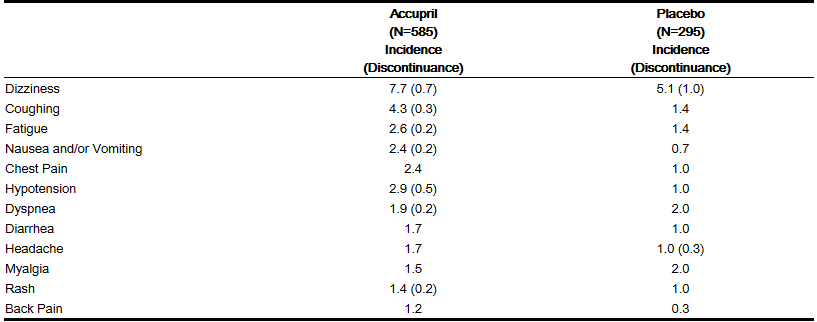Quinapril adverse reactions
Editor-In-Chief: C. Michael Gibson, M.S., M.D. [1]; Associate Editor(s)-in-Chief: Ahmed Zaghw, M.D. [2], Amr Marawan, M.D. [3]
For patient information about Quinapril, click here.
Quinapril
Quinapril and Hydrochlorothiazide tablet
Overview
Quinapril tablet is an angiontensin converting enzyme inhibitor drug that is FDA approved for the treatment of hypertension, heart failure, left ventricular dysfunction after myocardial infarction, diabetic nephropathy. Adverse reactions include hypotension, rash, hyperkalemia, disorder of taste, cough. hypotension, rash, hyperkalemia, disorder of taste, cough.
Category
Antihypertensive Agents, Angiotensin Converting Enzyme Inhibitors. Editor-In-Chief: C. Michael Gibson, M.S., M.D. [4]; Associate Editor(s)-in-Chief: Amr Marawan, M.D. [5]
Adverse Reactions
Hypertension
ACCUPRIL has been evaluated for safety in 4960 subjects and patients. Of these, 3203 patients, including 655 elderly patients, participated in controlled clinical trials. ACCUPRIL has been evaluated for long-term safety in over 1400 patients treated for 1 year or more.
Adverse experiences were usually mild and transient.
In placebo-controlled trials, discontinuation of therapy because of adverse events was required in 4.7% of patients with hypertension.
Adverse experiences probably or possibly related to therapy or of unknown relationship to therapy occurring in 1% or more of the 1563 patients in placebo-controlled hypertension trials who were treated with ACCUPRIL are shown below:
 |
Heart Failure
ACCUPRIL has been evaluated for safety in 1222 ACCUPRIL treated patients. Of these, 632 patients participated in controlled clinical trials. In placebo-controlled trials, discontinuation of therapy because of adverse events was required in 6.8% of patients with congestive heart failure.
Adverse experiences probably or possibly related or of unknown relationship to therapy occurring in 1% or more of the 585 patients in placebo-controlled congestive heart failure trials who were treated with ACCUPRIL are shown below:
 |
Hypertension and/or Heart Failure
Clinical adverse experiences probably, possibly, or definitely related, or of uncertain relationship to therapy occurring in 0.5% to 1.0% (except as noted) of the patients with CHF or hypertension treated with ACCUPRIL (with or without concomitant diuretic) in controlled or uncontrolled trials (N=4847) and less frequent, clinically significant events seen in clinical trials or post-marketing experience (the rarer events are in italics) include (listed by body system):
General
back pain, malaise, viral infections, anaphylactoid reaction
Cardiovascular
palpitation, vasodilation, tachycardia, heart failure, hyperkalemia, myocardial infarction, cerebrovascular accident, hypertensive crisis, angina pectoris, orthostatic hypotension, cardiac rhythm disturbances, cardiogenic shock
Hematology
Gastrointestinal
Flatulence, dry mouth or throat, constipation, gastrointestinal hemorrhage, pancreatitis, abnormal liver function tests, dyspepsia
Nervous/Psychiatric
Somnolence, vertigo, syncope, nervousness, depression, insomnia, paresthesia
Integumentary
Alopecia, increased sweating, pemphigus, pruritus, exfoliative dermatitis, photosensitivity reaction, dermatopolymyositis
Urogenital
urinary tract infection, impotence, acute renal failure, worsening renal failure
Respiratory
Other
Amblyopia, edema, arthralgia, pharyngitis, agranulocytosis, hepatitis, thrombocytopenia
Angioedema
Angioedema has been reported in patients receiving ACCUPRIL (0.1%). Angioedema associated with laryngeal edema may be fatal. If angioedema of the face, extremities, lips, tongue, glottis, and/or larynx occurs, treatment with ACCUPRIL should be discontinued and appropriate therapy instituted immediately.
Clinical Laboratory Test Findings
Hematology
(See Warnings)
Hyperkalemia
(See Precautions)
Creatinine and Blood Urea Nitrogen
Increases (>1.25 times the upper limit of normal) in serum creatinine and blood urea nitrogen were observed in 2% and 2%, respectively, of all patients treated with ACCUPRIL alone. Increases are more likely to occur in patients receiving concomitant diuretic therapy than in those on ACCUPRIL alone. These increases often remit on continued therapy. In controlled studies of heart failure, increases in blood urea nitrogen and serum creatinine were observed in 11% and 8%, respectively, of patients treated with ACCUPRIL; most often these patients were receiving diuretics with or without digitalis.[1]
References
Adapted from the FDA Package Insert.